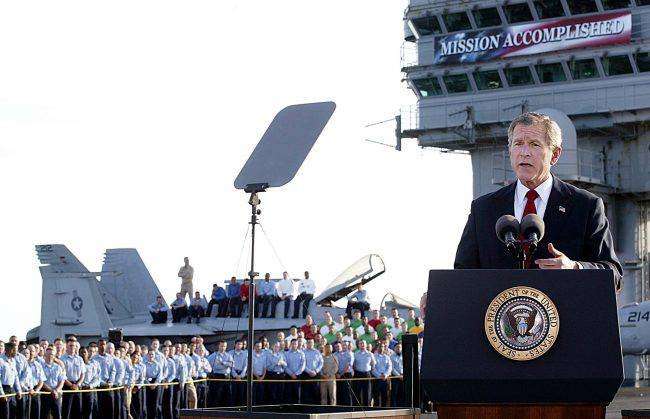The U.S. has spent over $5.9 trillion on wars that have directly led to the deaths of close to 500,000 people since the 9/11 attacks in September 2001.
Around 370,000 died due to direct war-related violence, while several times more died as a result of the indirect effects of war such as malnutrition and damaged infrastructure, according to Costs of War, an annual research project published by the Watson Institute for International and Public Affairs at Brown University.
READ MORE: Canadian Jon Snyder helped save 50 Afghan recruits from the Taliban. Three days later, he died
Some 250,000 civilians have perished as a result of the fighting caused by American wars, which have displaced or made refugees of 10.1 million people in Iraq, Afghanistan and Pakistan, the project found.
Over 6,900 U.S. military personnel have died at war, in addition to over 7,800 U.S. contractors and over 110,000 enemy fighters.
The figures do not include the over 500,000 deaths from the Syrian war, which has raged since 2011 when rebels backed by the U.S. and other Western powers tried to overthrow the government of President Bashar Al-Assad.
WATCH: Canadian ISIS fighter captured in northern Syria says he wants to return to Canada
The $5.9 trillion figure is nearly five times higher than the Pentagon’s estimate, said the Cost of War budget report, because it includes all spending across the U.S. federal government that came as a consequence of these wars.
The spending included costs such as on veterans’ services, preventative measures against terrorism and interest on debts incurred to bankroll the wars — debts were included because “war appropriations for Iraq and Afghanistan were not funded with new taxes or war bonds, but by deficit spending and borrowing.”
Spending is expected to balloon to over $6.7 trillion by 2023, based on Pentagon spending estimates for ongoing operations in Iraq, Syria, Afghanistan and Pakistan.
An additional $8 trillion could be added through the year 2054 if future interest costs on borrowing are included.
READ MORE: Pentagon denies Russia’s claim that it dropped phosphorus bombs on Syrian village
“There is no strategy for ending the wars,” wrote political science professor Neta Crawford.
“The fact that the U.S. keeps spending huge sums for wars that, at least in Afghanistan, are in a stalemate, and in Iraq and Syria, are unresolved, is a long-term budgetary problem which will affect future generations.”
WATCH: U.S. official in charge of Afghanistan reconstruction efforts discusses setbacks
Weeks after Al-Qaeda terrorists flew two airplanes into the World Trade Center, the U.S. set off on a global war against terrorism, starting with an invasion of Afghanistan.
Seventeen years later, Afghanistan remains mired in chaos.
Over 36 people were killed in various attacks last month as Afghans went to the polls for the country’s first parliamentary elections in eight years.
The number of civilians killed in Afghanistan in 2018 is on track to rank among the highest since 2001.
WATCH: 15 dead after suicide attack in Afghan capital on election day
The Islamic State has established a presence in the country, and claimed responsibility for a suicide attack that left four dead on Monday.
On Thursday, at least 30 Afghan forces were slaughtered by Taliban insurgents.
Meanwhile, the U.S. continues to seek an exit strategy.
READ MORE: Utah mayor killed in Afghanistan while on duty
In 2003, the U.S. orchestrated the overthrow of Iraqi President Saddam Hussein, who they accused of developing weapons of mass destruction and providing safe haven to terrorists.
After years of battling Al-Qaeda terrorists, the U.S. grappled with — and eventually led a military defeat of — the Islamic State. But the group continues to wreak violence using insurgency tactics such as bombings and attacks on security forces.
The country’s prime minister recently claimed that hundreds of militants based in Syria have been trying to cross into Iraq to recapture territory.
WATCH: Mosul, Iraq is facing several challenges post-ISIS
Earlier this month, a United Nations report announced the discovery of over 200 mass graves in former ISIS territory in Iraq. The dead included women, children, the elderly, people with disabilities as well as members of Iraqi police and security forces.
While Afghanistan and Pakistan have seen their fair share of casualties, most of the 500,000 deaths lost in warring since 9/11 took place in Iraq, researchers found.
Between 182,000 and 204,000 civilians, over 4,500 U.S. military personnel, 245 journalists and 62 humanitarian workers died as a direct result of war violence in Iraq between October 2001 and October 2018.
“This update just scratches the surface of the human consequences of 17 years of war,” Crawford wrote. “Too often, legislators, NGOs, and the news media that try to track the consequences of the wars are inhibited by governments determined to paint a rosy picture of perfect execution and progress.”
The authors of the Costs of War reports stated that casualties and U.S. spending are only poised to grow, with the U.S. currently carrying out counter-terrorism activities in some 76 countries around the world.

LudovicoSpecs on November 17th, 2018 at 14:17 UTC »
War Is a Racket 1935
by Smedley D. Butler, a retired United States Marine Corps Major General and two-time Medal of Honor recipient:
chefsteev on November 17th, 2018 at 13:42 UTC »
The onion nailed it with this piece published at Bush’s inauguration in Jan 2001: https://politics.theonion.com/bush-our-long-national-nightmare-of-peace-and-prosperi-1819565882
DisMyWeedAccount420 on November 17th, 2018 at 12:58 UTC »
Half a million sounds like a huge underestimate.